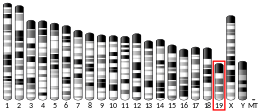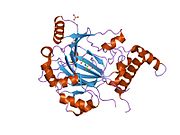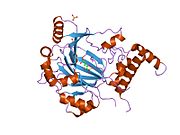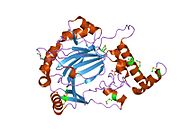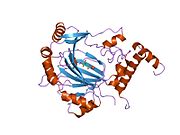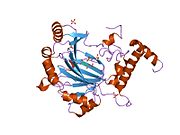HIF1AN
Appearance
(Redirected from HIF1AN (gene))
Hypoxia-inducible factor 1-alpha inhibitor (FIH) is a protein that in humans is encoded by the HIF1AN gene.[5][6]
Interactions
[edit]FIH has been shown to interact with HIF1A[5] and Von Hippel-Lindau tumor suppressor.[5] Additionally, asparaginyl hydroxylation of HIF1α by FIH-1 (HIF1AN) at N803 impairs its interaction with CBP/P300.[7]
References
[edit]- ^ a b c GRCh38: Ensembl release 89: ENSG00000166135 – Ensembl, May 2017
- ^ a b c GRCm38: Ensembl release 89: ENSMUSG00000036450 – Ensembl, May 2017
- ^ "Human PubMed Reference:". National Center for Biotechnology Information, U.S. National Library of Medicine.
- ^ "Mouse PubMed Reference:". National Center for Biotechnology Information, U.S. National Library of Medicine.
- ^ a b c Mahon PC, Hirota K, Semenza GL (Oct 2001). "FIH-1: a novel protein that interacts with HIF-1α and VHL to mediate repression of HIF-1 transcriptional activity". Genes Dev. 15 (20): 2675–86. doi:10.1101/gad.924501. PMC 312814. PMID 11641274.
- ^ "Entrez Gene: HIF1AN hypoxia-inducible factor 1, alpha subunit inhibitor".
- ^ Chen C, Lou T (2017). "Hypoxia inducible factors in hepatocellular carcinoma". Oncotarget. 8 (28): 46691–703. doi:10.18632/oncotarget.17358. PMC 5542303. PMID 28493839.
Further reading
[edit]- Lando D, Peet DJ, Whelan DA, Gorman JJ, Whitelaw ML (2002). "Asparagine hydroxylation of the HIF transactivation domain a hypoxic switch". Science. 295 (5556): 858–61. Bibcode:2002Sci...295..858L. doi:10.1126/science.1068592. PMID 11823643. S2CID 24045310.
- Freedman SJ, Sun ZY, Poy F, Kung AL, Livingston DM, Wagner G, Eck MJ (2002). "Structural basis for recruitment of CBP/p300 by hypoxia-inducible factor-1α". Proc. Natl. Acad. Sci. U.S.A. 99 (8): 5367–72. Bibcode:2002PNAS...99.5367F. doi:10.1073/pnas.082117899. PMC 122775. PMID 11959990.
- Hewitson KS, McNeill LA, Riordan MV, Tian YM, Bullock AN, Welford RW, Elkins JM, Oldham NJ, Bhattacharya S, Gleadle JM, Ratcliffe PJ, Pugh CW, Schofield CJ (2002). "Hypoxia-inducible factor (HIF) asparagine hydroxylase is identical to factor inhibiting HIF (FIH) and is related to the cupin structural family". J. Biol. Chem. 277 (29): 26351–5. doi:10.1074/jbc.C200273200. PMID 12042299.
- Lando D, Peet DJ, Gorman JJ, Whelan DA, Whitelaw ML, Bruick RK (2002). "FIH-1 is an asparaginyl hydroxylase enzyme that regulates the transcriptional activity of hypoxia-inducible factor". Genes Dev. 16 (12): 1466–71. doi:10.1101/gad.991402. PMC 186346. PMID 12080085.
- Dann CE, Bruick RK, Deisenhofer J (2003). "Structure of factor-inhibiting hypoxia-inducible factor 1: An asparaginyl hydroxylase involved in the hypoxic response pathway". Proc. Natl. Acad. Sci. U.S.A. 99 (24): 15351–6. doi:10.1073/pnas.202614999. PMC 137720. PMID 12432100.
- Elkins JM, Hewitson KS, McNeill LA, Seibel JF, Schlemminger I, Pugh CW, Ratcliffe PJ, Schofield CJ (2003). "Structure of factor-inhibiting hypoxia-inducible factor (HIF) reveals mechanism of oxidative modification of HIF-1 alpha". J. Biol. Chem. 278 (3): 1802–6. doi:10.1074/jbc.C200644200. PMID 12446723.
- Lee C, Kim SJ, Jeong DG, Lee SM, Ryu SE (2003). "Structure of human FIH-1 reveals a unique active site pocket and interaction sites for HIF-1 and von Hippel-Lindau". J. Biol. Chem. 278 (9): 7558–63. doi:10.1074/jbc.M210385200. PMID 12482756.
- Koivunen P, Hirsilä M, Günzler V, Kivirikko KI, Myllyharju J (2004). "Catalytic properties of the asparaginyl hydroxylase (FIH) in the oxygen sensing pathway are distinct from those of its prolyl 4-hydroxylases". J. Biol. Chem. 279 (11): 9899–904. doi:10.1074/jbc.M312254200. PMID 14701857.
- Linke S, Stojkoski C, Kewley RJ, Booker GW, Whitelaw ML, Peet DJ (2004). "Substrate requirements of the oxygen-sensing asparaginyl hydroxylase factor-inhibiting hypoxia-inducible factor". J. Biol. Chem. 279 (14): 14391–7. doi:10.1074/jbc.M313614200. PMID 14734545.
- Kato H, Tamamizu-Kato S, Shibasaki F (2004). "Histone deacetylase 7 associates with hypoxia-inducible factor 1alpha and increases transcriptional activity". J. Biol. Chem. 279 (40): 41966–74. doi:10.1074/jbc.M406320200. PMID 15280364.
- Rual JF, Venkatesan K, Hao T, Hirozane-Kishikawa T, Dricot A, Li N, Berriz GF, Gibbons FD, Dreze M, Ayivi-Guedehoussou N, Klitgord N, Simon C, Boxem M, Milstein S, Rosenberg J, Goldberg DS, Zhang LV, Wong SL, Franklin G, Li S, Albala JS, Lim J, Fraughton C, Llamosas E, Cevik S, Bex C, Lamesch P, Sikorski RS, Vandenhaute J, Zoghbi HY, Smolyar A, Bosak S, Sequerra R, Doucette-Stamm L, Cusick ME, Hill DE, Roth FP, Vidal M (2005). "Towards a proteome-scale map of the human protein-protein interaction network". Nature. 437 (7062): 1173–8. Bibcode:2005Natur.437.1173R. doi:10.1038/nature04209. PMID 16189514. S2CID 4427026.
- Cockman ME, Lancaster DE, Stolze IP, Hewitson KS, McDonough MA, Coleman ML, Coles CH, Yu X, Hay RT, Ley SC, Pugh CW, Oldham NJ, Masson N, Schofield CJ, Ratcliffe PJ (2006). "Posttranslational hydroxylation of ankyrin repeats in IκB proteins by the hypoxia-inducible factor (HIF) asparaginyl hydroxylase, factor inhibiting HIF (FIH)". Proc. Natl. Acad. Sci. U.S.A. 103 (40): 14767–72. Bibcode:2006PNAS..10314767C. doi:10.1073/pnas.0606877103. PMC 1578504. PMID 17003112.
- Coleman ML, McDonough MA, Hewitson KS, Coles C, Mecinovic J, Edelmann M, Cook KM, Cockman ME, Lancaster DE, Kessler BM, Oldham NJ, Ratcliffe PJ, Schofield CJ (2007). "Asparaginyl hydroxylation of the Notch ankyrin repeat domain by factor inhibiting hypoxia-inducible factor". J. Biol. Chem. 282 (33): 24027–38. doi:10.1074/jbc.M704102200. PMID 17573339.
- Chen C, Lou T (2017). "Hypoxia inducible factors in hepatocellular carcinoma". Oncotarget. 8 (28): 46691–703. doi:10.18632/oncotarget.17358. PMC 5542303. PMID 28493839.




